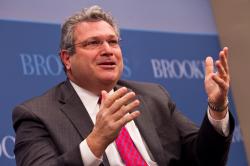

9:00 am EDT - 10:00 am EDT
Past Event
9:00 am - 10:00 am EDT
1775 Massachusetts Avenue N.W.
Washington, DC
20036
For 70 years, the Truman Doctrine has guided U.S. foreign policy, tying the United States to support for democracy, open societies, and market economies across the globe. Rallying a war-weary nation, President Harry Truman laid the foundation for a system of alliances in Europe and Asia, international institutions for economic cooperation, and the spread of human rights that underlay U.S. Cold War strategy. Seven decades later, what relevant lessons of the Truman Doctrine remain?
On July 19, Foreign Policy at Brookings hosted U.S. Senator Tim Kaine (D-Va) for a discussion of these themes from his new article for Foreign Affairs, “A new Truman Doctrine: Grand strategy in a hyperconnected world.” While much has changed since the early Cold War, the senator’s call for a revitalized, 21st century Truman Doctrine recognizes that essential questions of Harry Truman’s time ring true today.
How can the United States work to bolster democracies in a world of rising authoritarian powers? Can the United States selectively engage with authoritarian states such as Russia and China? And, in addition to these similarities to Truman’s days, how should the United States operate when the diffusion of power and connectivity among nations has strengthened non-state actors, for good and ill?
Following Senator Kaine’s featured remarks, historian and scholar Robert Kagan, senior fellow with Brookings’s Project on International Order and Strategy, joined the senator for a conversation on U.S grand strategy in this new hyperconnected and geopolitically competitive era.
Related Content

Derek Chollet, Eric S. Edelman, Michèle Flournoy, Stephen J. Hadley, Martin S. Indyk, Bruce Jones, Robert Kagan, Kristen Silverberg, Jake Sullivan, Thomas Wright
February 22, 2017

Thomas Wright
May 23, 2017

Bruce D. Jones Strobe Talbott Will Moreland
February 28, 2017



Sam Boocker, Alexander Conner, David Wessel
April 25, 2024
2024
The Brookings Institution, Washington DC
10:00 am - 11:15 am EDT

Constanze Stelzenmüller
April 22, 2024